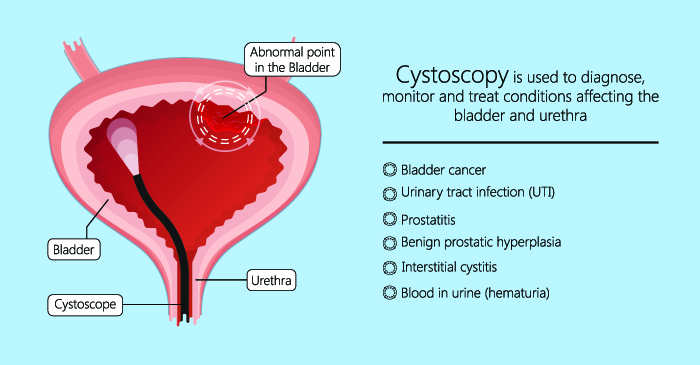Urology Women Cystoscopy Treatment & Diagnostics in Chirag Enclave, Delhi
Cystoscopy Treatment
Cystoscopy is a technique that allows the health provider to check the urinary tract, especially the bladder, the urethra, and the ureters' openings. Cystoscopy may help identify problems with the urinary tract. Early symptoms of cancer, infection, narrowing, blockage, or bleeding might include these.
A long, flexible, light tube, termed a cystoscope, inserted into the urethra and pushed up into the bladder during this operation. The healthcare professional can check the urethra and bladder carefully here. They can also wash the bladder and access structures through the scope with special instruments.
The health care provider might take tissue for additional examination during a cystoscopy (called a biopsy). During the process, some issues might be treated.
The cystoscopy doctors in New Delhi can assist you if you are seeking cystoscopy treatment.

About Cystoscopy Treatment
You must go to the bathroom just before the cystoscopy to empty your bladder. You are dressed in an operating gown and lie down on a treatment table on your back. Your feet can be placed in stirrups. The nurse can provide antibiotics to prevent a bladder infection.
You'll give anesthesia at this moment. If you get anesthesia, it's all you're aware of till you wake up. In addition, you may get sedatives to help you relax if you have a local or regional anesthetic. Your urethra will numb with an anesthetic gel or spray. Although there are still feelings, the gel makes the process more convenient. After lubricating it with gel, the doctor carefully inserts the scope in the urethra. It might be slightly burning, like urinating.
If the procedure is investigated, your doctor will utilize a flexible scope. Biopsies or other procedures require a slightly thicker, more rigid scope. Operational instruments may pass through because of the broader range.
As your bladder enters the scope, your doctor examines it through a lens. A sterile solution also floods your bladder. It helps your doctor to see what is happening. The fluid may give you an uncomfortable sense of urination.
Your cystoscopy will likely take less than five minutes with local anesthesia. If you are sedated or given general anesthesia, it may take 15-30 minutes for the whole Procedure.
Who Qualifies for Cystoscopy Treatment?
Cystoscopy is possible for individuals with the following conditions:
- Severe urinary problems patients
- Recurrent urinary tract infections in patients
Why is Cystoscopy Conducted
Your doctor may advise cystoscopy to:
- Check for signs such as blood in your urine, overactive bladder, incontinence, or pain when you are peeing.
- Find the source of frequent infections of the urinary tract.
- Diagnosis of bladder disorders include bladder stones, bladder cancer, and bladder inflammation (cystitis)
- A cystoscope can be used to remove tiny tumors.
- Enlarged prostate diagnosis
Benefits of Cystoscopy
The benefits of cystoscopy are:
- The procedure is performed to determine why any urinary problem is present.
- This method may take a sample of bladder tissue and urine.
- The technique is also used to inject dye for kidney MRI (Magnetic Resonance Imaging).
Request an appointment at Apollo Spectra Hospitals, Chirag Enclave, Delhi
Call 1860 500 2244 to book an appointment
Risks of Cystoscopy
Complications associated with cystoscopy include:
- Infection. Cystoscopy can occasionally introduce germs into your urinary system, causing illness. Cystoscopy may irritate an existing urinary tract infection and worsen it. Your doctor may give antibiotics in certain circumstances before and after your cystoscopy to prevent infection.
- Bleeding. Urine may include blood after a cystoscopy. Bleeding can be dangerous in some instances.
- Pain. When you have a cystoscopy, you may have stomach pain and a burning feeling when you urinate. These symptoms are minor in most situations and lessen gradually after the surgery.
When performed under general anesthesia, cystoscopy is usually not painful. There may be an uncomfortable feeling like urinating or a burning sensation when the tube is inserted or released from the urethra if only local anesthetics have been given to you.
Cystoscopy is a diagnostic technique that has no incisions and is a minor surgery.
Some pain and a burning feeling may occur for one or two days after cystoscopy. This Procedure does not involve long-term results.
- If the patient is sedated, it might take some time for them to wake up. After one day, the patient is free to continue normal activities.
- There may be urethra bleeding, blood in the urine, and other complications following a cystoscopy. Consult a doctor right away if these problems are severe.
- To alleviate pain, wipe the urethra with a warm-water-soaked towel. Repeat if required
- Ensure that you consume enough water. It will aid in bladder flushing and reduce irritation.
Symptoms
Our Top Specialities
NOTICE BOARD
CONTACT US
CONTACT US
 Book Appointment
Book Appointment


.svg)
.svg)
.svg)
.svg)








